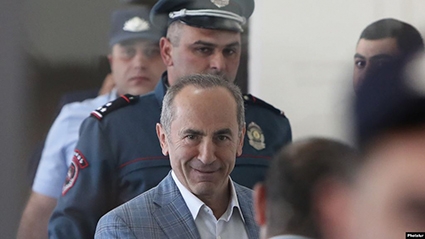Trial against Former Armenian President Kocharyan Launched amid Rising Tensions
The trials of the former president of Armenia, Robert Kocharian (1998-2008), and three of his key officials have been launched. The former president faces charges of overthrowing the constitutional order on March 1, 2008 and stands in violation of the Constitution of Armenia for using army units to shoot at and disperse the ten-day sit-in and non-stop demonstrations which came as a result of the disputed and widely criticized 2008 presidential elections.
On February 19, 2008, the first President of Armenia, Levon Ter-Petrosyan (1991-1998), succeeded in uniting the opposition forces in support of his nomination. According to the official results of the most criticized Armenian presidential elections, President Ter-Petrosyan, who was the second in the race, failed to recognize the official results of the elections and urged his supporters to start non-stop peaceful demonstrations in the center of Yerevan until the hearings of his lawsuit at the Constitutional Court. The non-stop demonstrations soon brought results, as a number of key governmental officials, including ambassadors and diplomats, spoke out in support of the opposition movement. According to the investigation, on the third consecutive day of the non-stop demonstrations, Kocharyan ordered his Defense Minister Mikael Harutyunyan to form special army units made up of officers loyal to Kocharyan, and locate them in the capital of Armenia to use them against the opposition movement, which was increasing in size and power by the day.
On the 10th consecutive day of the peaceful demonstrations, the opposition protesters were attacked by police forces on Freedom Square. The leader of the peaceful demonstrations was forcefully taken to his residence and kept there, while his supporters started another demonstration lead by current Prime Minister of Armenia, Nikol Pashinyan, calling for the immediate release of the first president and for the government to secure the safety of the peaceful demonstrations.
Hours later, the government attacked the demonstration, opening fire and shooting at least eight peaceful demonstrators.
As a result of the attack, two police officers were killed. The heads of the National Security and Special Investigative Service, during their joint interview in September 2018, said one of the officers was killed by an officer of a special regiments unit for propaganda purposes so as to allow a state of emergency to be announced and to show that the opposition movement was not peaceful and was violent.
After the dispersion of the peaceful demonstration, Kocharyan’s administration launched a wave of political repressions against the opposition supporters, arresting hundreds of political activists and supporters of opposition and suspending the media from publishing for 40 days. Pashinyan, who was one of the key members of Ter-Petrosyan’s political camp, went into hiding for 1.4 years, after which he voluntarily went to the Prosecutor’s Office and as a result spent two years in prison, only released as a result of Ter-Petrosyan’s political dialogue with the government in 2011.
Kocharyan and his officials, charged for overthrowing the constitutional order, do not recognize themselves as guilty and say they are victims of a political vendetta launched by Pashinyan as revenge for his imprisonment. Public opinion and leading experts find these justifications amusing. Kocharyan, who was the only person responsible for giving orders to the Army, now says that he was not informed about the commands of his Defense Ministry and that he would have been unable to overthrow the constitutional order as he was the guardian of that very same order.
A representative of the victims of the March 1 attack, Vahe Grigoryan, said the investigation has disclosed “shocking information” about the tragedy of 11 years ago.
This trial, which is one of the most important in the history of Armenia, however, has generated problems in Armenian-Russian relations, as Russian President Vladimir Putin is publicly demonstrating his support for Kocharyan, congratulating his imprisoned colleague, a fact which has become a topic of anecdotes and jokes in Armenia.
Russian Foreign Minister Sergey Lavrov has also criticized Pashinyan’s government for political revenge against the political opponents of the government. The leading Russian state-owned TV channels have already released several news manipulations on this topic blaming Pashinyan for political vendetta and revenge.
Russia even rejected the extradition of the former Defense Minister of Armenia, Mikael Harutyunyan, one of the key actors of the March 1 shooting, claiming that the former Armenian Minister of Defense and the Chief of the General HQ of the Armenian army has received Russian citizenship.
According to an adviser of the government of Russia and the editor in chief of Regnum news agency, Modest Kovelov’s interview on Armenian online portal 1in.am, Pashinyan categorically refused to listen to Putin’s opinion on the Kocharyan trial or discuss the topic, which was received with anger in Moscow, as Kocharyan had worked in the interest of Kremlin and is recognized as a friend and ally of the Kremlin in Armenia.
The trials of Kocharyan and the key members of his administration who had connections to the attack have increased tensions in Armenia. Kocharyan’s supporters attacked a prominent Armenian civil activist Vardges Gaspari when he attempted to enter to the hearings with a poster “Robert murderer.” Last Thursday, a large number of civil activists gathered to support Gaspari against Kocharyan, while down the street a smaller number of Kocharyan-supporters were demonstrating.
According to rumors, Kocharyan’s team is offering 20.000 AMD (about 100 GEL) for citizens to participate in demonstrations in support of Kocharyan, however this GT reporter in Armenia failed to confirm this..
By Karen Tovmasyan












